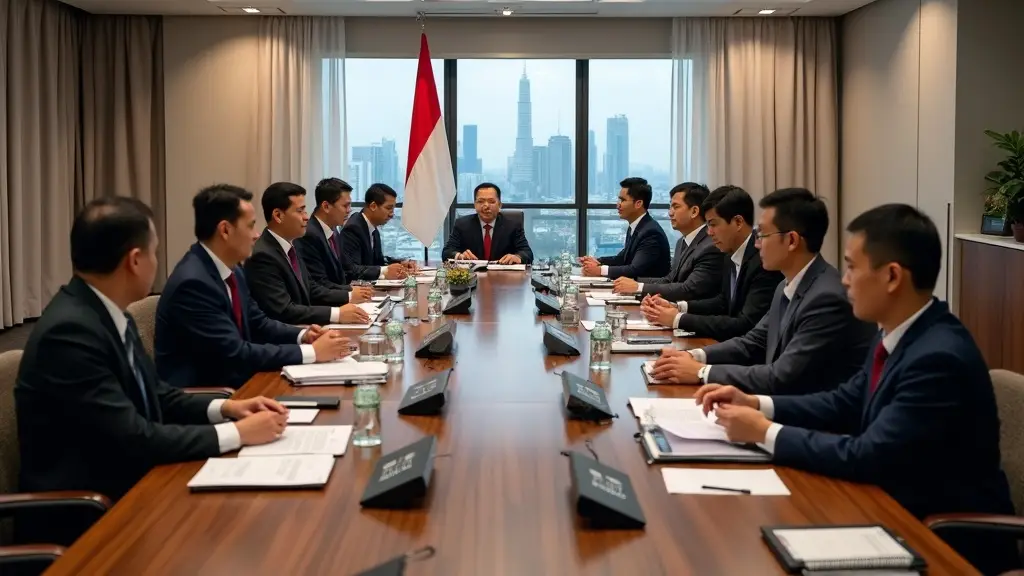Indonesia Considers Adding Bitcoin to National Reserves
Indonesia is currently considering a groundbreaking proposal to add Bitcoin (BTC) to its national reserves, a strategic move with support from the Vice President’s office and other key parties. The proposal suggests allocating an estimated $18.3 billion to Bitcoin through the Daya Anagata Nusantara Investment Management Agency (BPI Danantara). Proponents of the plan argue that this allocation could serve a dual purpose: to help reduce the nation’s debt and to significantly diversify its financial reserves.
This initiative signals a forward-thinking approach to national economic strategy, moving beyond traditional fiat and commodity-based reserves to embrace digital assets. This initiative, if approved, would position Indonesia among the first South-east Asian countries to include Bitcoin in its sovereign wealth fund, marking a significant step in the region’s crypto landscape and potentially inspiring other nations to follow suit. This strategic move highlights a new paradigm in macro-financial policy, where cryptocurrencies are seen as a tool for economic resilience and national development.
BPI Danantara: A New Agency for Digital Asset Management
The core of this ambitious proposal centres around BPI Danantara, a new state-run agency launched in February 2025. This agency is tasked with the independent management of state assets with the primary goal of boosting national development. The proposed Bitcoin allocation would be managed by BPI Danantara, which could potentially acquire and hold up to 200,000 BTC. The profits generated from this strategic holding would then be used to ease national debt pressures, providing a novel mechanism for fiscal management.
This approach highlights a new model of sovereign wealth management, where digital assets are seen not just as speculative investments but as strategic tools for national economic development and stability. The agency’s independent nature is crucial, as it allows for agile decision-making and professional management of a volatile yet potentially lucrative asset class. The creation of such a specialised agency demonstrates a commitment to a professional and structured approach to integrating a new asset class into the national treasury.
Bitcoin Mining as Part of a National Reserve Strategy
Bitcoin advocates have proposed incorporating Bitcoin mining into Indonesia’s national reserve strategy, allowing the country to accumulate Bitcoin through market purchases and generate new Bitcoin directly. This innovative approach would enhance Indonesia’s financial independence and position it at the forefront of the global crypto-economic revolution.
The proposal aligns with the country’s centenary of independence and the country’s centenary of independence. The ability to generate a new reserve asset internally could reduce dependency on external markets and provide a continuous stream of assets, further bolstering the nation’s financial sovereignty.
The Broader Implications for South-east Asia
Indonesia’s proposal to add Bitcoin to its national reserves could significantly impact the South-east Asian region and the global crypto market. As one of the first countries to integrate Bitcoin into its sovereign wealth fund, Indonesia could signal the legitimization of digital assets. This move could encourage neighboring countries to adopt similar strategies, accelerating the adoption of cryptocurrencies in national financial frameworks across Asia.
The proposal focuses on leveraging Bitcoin to reduce national debt and diversify reserves, highlighting a new paradigm in macro-financial policy. This move would solidify Bitcoin’s position as a legitimate asset class and transform the geopolitical landscape.
Bitcoin as a Hedge Against Inflation and Fiat Vulnerability
Bitcoin’s integration into national reserves is seen as a potential hedge against inflation and fiat currency vulnerabilities. Its decentralised nature and fixed supply make it a robust alternative to traditional fiat currencies, which can be susceptible to inflationary pressures from government policy. Indonesia could allocate a portion of its reserves to Bitcoin, seeking to protect its national wealth from the long-term devaluation of fiat currencies.
This strategy aligns with the growing sentiment among financial experts and institutions that Bitcoin is “digital gold,” a scarce and censorship-resistant store of value. This move could be seen as a proactive measure to safeguard Indonesia’s financial future in a volatile global economic environment.
Bitcoin in National Reserves: Challenges and Risks
The proposal to add Bitcoin to national reserves is ambitious but faces significant challenges and risks. The price volatility of Bitcoin, which could lead to significant paper losses, is a primary concern. Critics argue that such a large allocation is risky for a sovereign wealth fund.
Additionally, regulatory hurdles arise as the legal framework for managing and securing such a large holding of a digital asset is still evolving. Technical and security risks, such as cyberattacks or misuse of private keys, need to be addressed with robust, institutional-grade solutions. Navigating these risks would be a crucial test for the newly formed BPI Danantara agency.
Indonesia’s Bitcoin Proposal: A Precedent for Assets
The path to the implementation of this groundbreaking proposal is a complex one, requiring approval from key governmental bodies and stakeholders. The current discussions with the vice president’s office and other parties are the first step in a long process that would need to address all the legal, financial, and technical considerations. If the proposal gains final approval, it would not only set a precedent for Indonesia but also serve as a powerful signal to the global crypto market.
The successful integration of Bitcoin into Indonesia’s national reserves would likely be watched closely by other nations in Asia and beyond, potentially triggering a new wave of sovereign wealth fund diversification into digital assets. This move would solidify Bitcoin’s position as a legitimate and strategic asset class, transforming the geopolitical landscape and paving the way for a new era of crypto-economic competition among nations. The future of Indonesia’s financial strategy, and potentially that of many other countries, could hinge on the outcome of this historic decision.
Read More: Bitcoin Miners’ July Earnings Hit Post-Halving High of $1.66B























